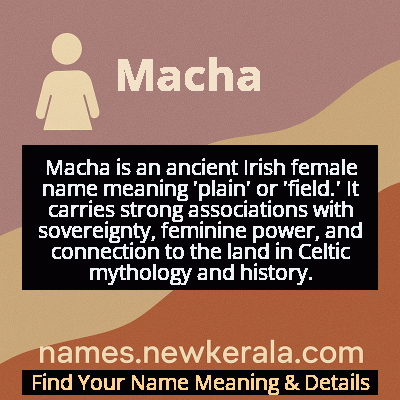Macha Name Meaning & Details
Origin, Popularity, Numerology Analysis & Name Meaning of Macha
Discover the origin, meaning, and cultural significance of the name MACHA. Delve into its historical roots and explore the lasting impact it has had on communities and traditions.
Name
Macha
Gender
Female
Origin
Irish
Lucky Number
8
Meaning of the Name - Macha
Macha is an ancient Irish female name meaning 'plain' or 'field.' It carries strong associations with sovereignty, feminine power, and connection to the land in Celtic mythology and history.
Macha - Complete Numerology Analysis
Your Numerology Number
Based on Pythagorean Numerology System
Ruling Planet
Saturn
Positive Nature
Ambitious, efficient, realistic, and authoritative.
Negative Traits
Materialistic, stressed, confrontational, and can be overly ambitious.
Lucky Colours
Dark blue, black.
Lucky Days
Saturday.
Lucky Stones
Blue sapphire, amethyst.
Harmony Numbers
2, 4, 6.
Best Suited Professions
Business leaders, managers, financial services, law enforcement.
What People Like About You
Leadership, determination, organizational skills.
Famous People Named Macha
Macha Mong Ruad
Legendary Queen
Only female High King of Ireland and founder of Emain Macha
Macha (Goddess)
Celtic Deity
Triple goddess of sovereignty, war, and horses in Irish mythology
Macha Mérédès
French Singer
Influential alternative music artist with distinctive vocal style
Name Variations & International Equivalents
Click on blue names to explore their detailed meanings. Gray names with will be available soon.
Cultural & Historical Significance
Throughout Irish history, the name has symbolized female leadership, resilience, and the deep connection between people and their homeland. The stories of Macha have been preserved in the Ulster Cycle of Irish mythology, particularly in the Táin Bó Cúailnge, where her legacy influences the events of the epic. The continued use of place names like Armagh (from Ard Mhacha, meaning 'Macha's height') demonstrates the enduring cultural impact of this mythological figure. Macha represents an archetype of feminine power that is both creative and destructive, nurturing and fierce, reflecting the complex understanding of womanhood in Celtic culture.
Extended Personality Analysis
Women named Macha are often perceived as strong-willed, independent, and deeply connected to their heritage. They typically exhibit natural leadership qualities with a fierce protective instinct toward those they care about. The mythological associations lend an air of strength and determination, suggesting someone who faces challenges head-on and doesn't shy away from difficult situations. At the same time, there's often a nurturing side that balances this strength - much like the goddess Macha who represented both war and fertility.
These individuals tend to be grounded and practical, with a strong sense of justice and loyalty to their community. Their personality often combines traditional values with progressive thinking, creating a unique blend of respect for heritage and forward-looking vision. The name suggests someone who is resilient in adversity, capable of great endurance, and possesses an innate understanding of cycles and natural rhythms. There's often a magnetic quality to their personality that draws others to them, combined with a certain mystique that comes from the name's ancient mythological roots. They're typically seen as people who honor their word and expect the same from others, with little tolerance for dishonesty or betrayal.
Modern Usage & Popularity
In contemporary times, Macha remains a relatively uncommon but culturally significant name, primarily used within Irish communities and by those with strong Celtic heritage connections. While it hasn't appeared on mainstream popularity charts, it has seen a modest resurgence among parents seeking traditional Irish names with mythological significance. The name is particularly favored by families interested in preserving Gaelic cultural heritage and those drawn to strong female names from mythology. Its usage is more frequent in Ireland and among diaspora communities, especially in contexts where traditional naming practices are valued. The name's uniqueness and powerful mythological associations make it appealing to parents looking for distinctive names with deep cultural roots, though its relative rarity means it's unlikely to become a mainstream choice in the foreseeable future.
Symbolic & Spiritual Meanings
Symbolically, Macha represents the intersection of feminine power, sovereignty, and connection to the land. The name embodies the concept of the land as mother and ruler, reflecting ancient Celtic beliefs where the health of the kingdom was tied to the rightful sovereign's relationship with the territory. It symbolizes strength in adversity, as demonstrated by the mythological Macha who competed in races while pregnant and laid powerful curses. The name also carries connotations of transformation and cyclical power - from warrior to mother, from ruler to avenger. In a broader sense, Macha represents the enduring spirit of Irish womanhood, the preservation of cultural identity, and the balance between fierce protection and nurturing care that characterizes many feminine archetypes in Celtic tradition. The symbolic meaning extends to themes of justice, the consequences of broken promises, and the idea that true strength often emerges from vulnerability and challenge.

